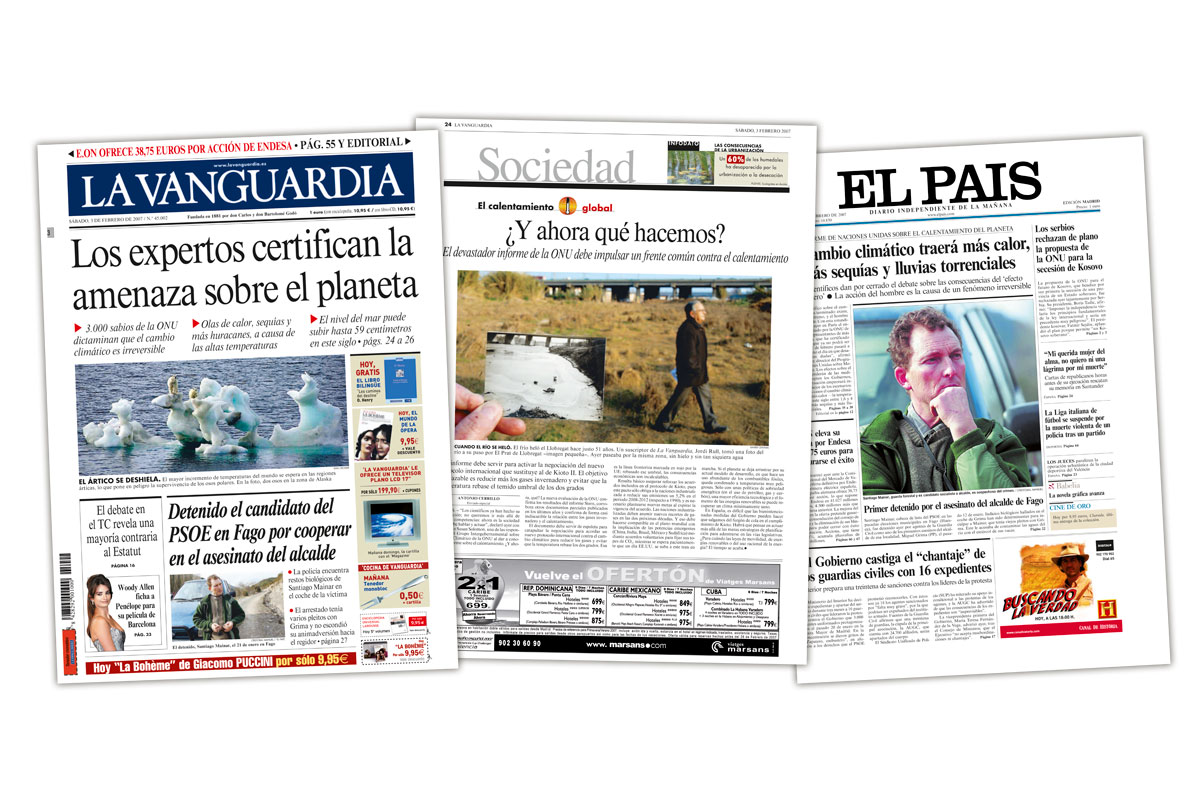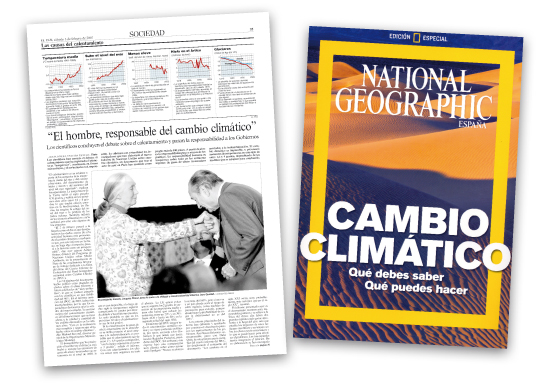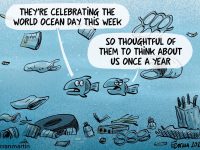
For some years now, no more than two decades, several scientific issues have been in the mass media. News about climate change, global warming and desertification appear in media coverage almost daily. From this journalistic platform (political ministries included), the environment has also made its mark on the political and economic agenda and even on the artistic agenda, with excellent movies like Avatar. This has led to a rise in a type of journalism, which in the eighties was purely anecdotal, so-called environmental journalism.
Although in many cases it is impossible to say which came first, the chicken or the egg, with respect to public awareness about environmental issues we can trace the origins, and safely state that journalism has played a key role. And it has not been easy. In the West, at least, the three great monotheistic religions –Judaism, Christianity and Islam– believe that nature exists to be subdued by mankind and to serve him alone.
Even today, for example, the Aqueduct in Segovia is considered a laudable monument, when in reality it carried water from the wetlands to dry regions, severely breaking the natural balance of ecosystems. Seldom are the destructive powers of the Roman aqueducts and roads explained. Nor does history recount how the Roman barbarians almost drove the brown bear to extinction in Europe, just for the fun of it. Even so, ancient Rome and its peoples were known as «civilized» people as compared to the Celts or the Guanches, considered, even by supposedly reliable historians, as barbarian or pagan peoples –with negative connotations– because they worshipped trees or rivers instead of human abstractions or symbols.
«The first step was for environmental journalists to explain to the public how nature works, how to care for it and, above all, how to conserve it»
Given these foundations (Judeo-Christian ideology that undervalues nature versus man and Roman tradition that considers the submission and modification of natural environmental conditions to be a cultural achievement), the fact that Western public opinion is ever more aware of the environment can be considered a social change as important and revolutionary as the emancipation of women or minorities’ achievement of social rights.
I would like to stress that the role played by journalism in bringing about this change has been fundamental. The first step was for environmental journalists to explain to the public how nature works, how to care for it and, above all, how to conserve it. The second step, which is only just beginning, goes even further: it involves replacing the image of man as the «chosen species» with man as a destructive and predatory species on the planet. Richard Attenborough’s documentary series or Richard Dawkins’ views point in this direction and this has triggered fierce opposition by the most reactionary sectors of society.
One idea that has been conveyed to the public is that the most important problem facing the planet is environmental deterioration caused, among other things, by the relentless and unsustainable population growth of a terrible predator species: mankind. To consider man as a «deadly plague» is a philosophical approach unprecedented in the West.
Scientists say that the only device capable of stopping the catastrophe, looming upon the planet, is to raise public awareness and this awareness cannot be achieved without journalism. Interestingly, journalism has become the weapon of choice to save the planet. This has not only boosted the environmental journalism genre, but also counter-initiatives that seek to destroy it.
The link between environmental and science journalism
One of the most intriguing aspects of this phenomenon, especially for those of us who study it from the academic point of view, is that environmental journalism is breaking away from science journalism. In Spain, for example, the association of science journalists coexists with the association of environmental journalists. Another example is the new degree offered by the Carlos III University of Madrid, where a compulsory subject called «Scientific and Environmental Journalism» has replaced the formerly compulsory «Journalism for Science and Technology» which figured in the previous Bachelor degree programme.

Moreover, climate change is an example of how environmental issues can turn into ideological ones. To deal with this, journalists should have sufficient knowledge and skill to identify reliable sources.
This change in a core subject of a degree course, or the fact that there are two different associations, can be viewed in two ways. From the positive viewpoint, it indicates the extraordinary importance given to environmental journalism over other areas. The radical avant-garde representation of the human species in relation to nature has not been in vain. From this viewpoint the differentiation is highly justifiable.
But there is also a darker side to this issue: segregating «environmental» from «scientific» may give the impression that it is not considered a «science», but an «ideology». If the environment is considered to be a science, like any other, why isn’t it taken care of by science journalists whose areas of expertise fall within ecology, atmospheric physics, particle physics (for nuclear energy), soil science, agricultural chemistry or marine biology, among others?
Its separation from science journalism is, therefore, controversial: if environment is science, this specification is redundant; and if it is not science –as some extreme right ideologists would like– its arguments cannot be considered valid bases for political or economic decisions. In other words, this differentiation could be seen to reinforce it as a science in its own right or, conversely, to exclude it.
Obviously, environmental studies constitute a pure science, a multidisciplinary one if you will, but just as scientific as particle physics, ecology, soil science or organic chemistry. The great danger, I stress, of divorcing environment from the word science is that by becoming independent it is not recognized by the public as a science and, therefore, its arguments are subject to value judgments, like literary or film critiques and, last but not least, environmental journalists are not trained under the strict ground rules underpinning science journalism of quality.
From the professional viewpoint, the environmental journalist should be, above all, a pure science journalist, which implies having excellent knowledge of physics, chemistry, biology and geology, at least to university degree level. Moreover, given the particular idiosyncrasies of environmental information, in which, for example, there are many biased information sources –aiming to manipulate public opinion– the environmental journalist must have far greater scientific knowledge than, for example, the journalist who specializes in astronomy, a field where information is readily available from press offices. The media coverage of astronomy, for example, is not of interest to information manipulators. There is no politicization possible of research results reporting the existence of a black hole in a particular galaxy. But it is quite another story for climate change, and the reporter must have enough knowledge to discuss research results and, more importantly, discern reliable information sources.
Science journalism, for example, has taken years to establish the criteria for selecting reliable information sources. To begin with, only those results which have been endorsed by prestigious journals are published, which, in turn, have undergone a blind peer review system with ensured repeatability of experiments. Thus, results published in journals like Nature or Science are preferred over others appearing in obscure or unknown journals.
Furthermore, science journalism has come to accept an important maxim: there is freedom of expression, but not freedom of opinion. For example, geographers, economists or sociologists will never write about the possibility of life on other planets; only geologists, chemists, physicists and biologists will do so. This has enabled us to differentiate science from pseudoscience, as far as possible.
«Environmental journalism is moving dangerously away from the path of science. Information sources are often of an ideological nature, such as environmentalists –who though not scientists are thought to be so by unskilled journalists– or politicians, lobbyists, economic agents, etc.»
However, environmental journalism is moving dangerously away from the path of science. All the research we have carried out concerning the sources used in environmental journalism confirms they are often of ideological nature, such as environmentalists –who though not scientists are thought to be so by unskilled journalists– or politicians, lobbyists, economic agents, etc. And, finally, there is something very strange, whereby bad journalism uses the odd term expert. It is curious that such a noun, or adjective, is hardly ever used in science journalism because it masks the source. So, what is an expert?
Environmental journalism employs this obscure term «expert» to justify something as detrimental to journalism as neutrality, which is never used in science journalism. Thus, for example, it gives voice to so-called climate change «sceptics», which is a scandal equal to reporting disbelief that man was ever on the Moon or those casting doubts on the theory of evolution.
These «experts» take refuge in pretentious titles like «director of the institute of such-and-such» to hide their lack of scientific wisdom, while the journalist never specifies how many articles they have published in Nature or if they hold a PhD in oceanography. This is turning environmental journalism into pseudo-journalism or, at best, something different from science journalism. Unless we change course, environmental journalism will become a Trojan horse for those wishing to destroy the planet instead of the planet-saving device it has been so far.
For example, a content analysis of those that usually appear as climate change sceptics in the Spanish media reveals that they have all studied Humanities (i.e., true scientific illiterates) ranging from: Antón Uriarte (Professor of Geography at the University of the Basque Country, where until recently geography and history were studied together and previously belonged to the area of philosophy and liberal arts) to journalists like Jorge Alcalde (also liberal arts); economists (by the way, where do Spanish economists study botany or ecology?) like Gabriel Calzada or political scientists (as if a degree in political science had anything to do with natural science), like Bjorn Lomborg. These information sources would never be used by a reliable science journalist, who would resort only to someone qualified in marine science, physics, chemistry, biology or other natural sciences. And this is what differentiates good journalism from trash reporting. I hope that in the future environmental and science journalism will not be differentiated thus.





